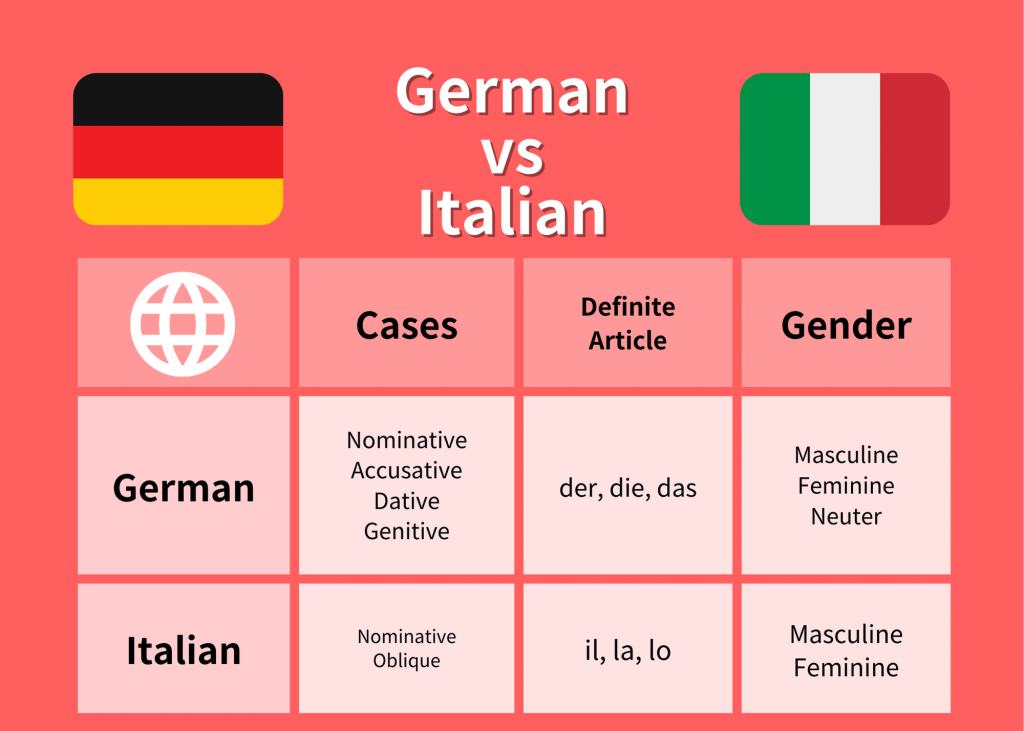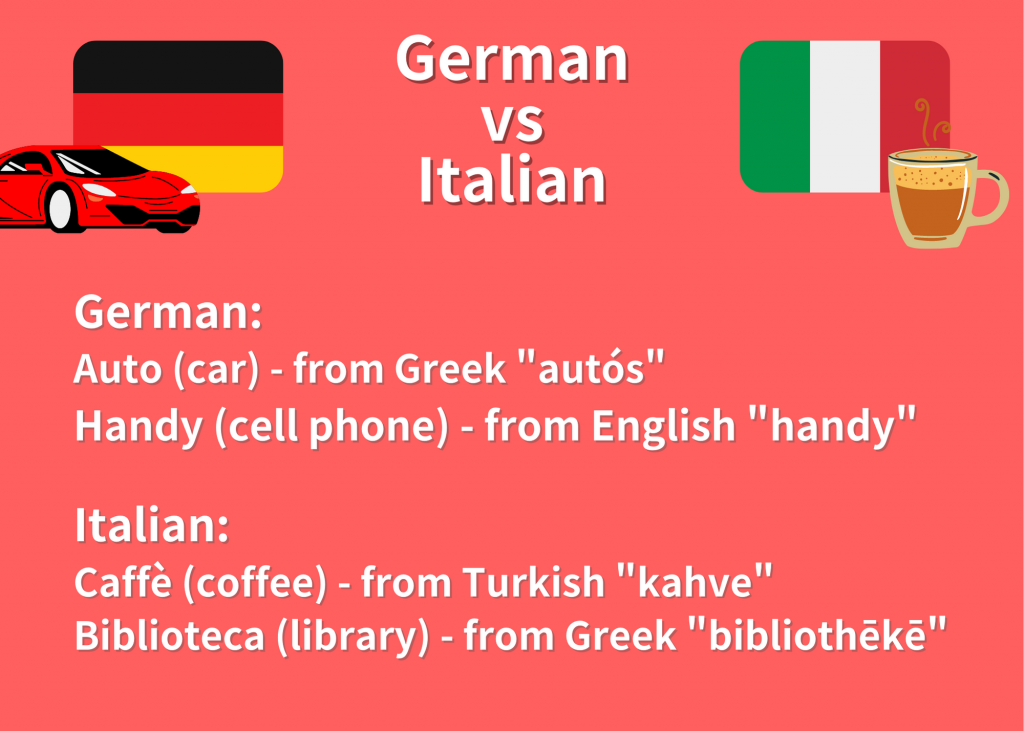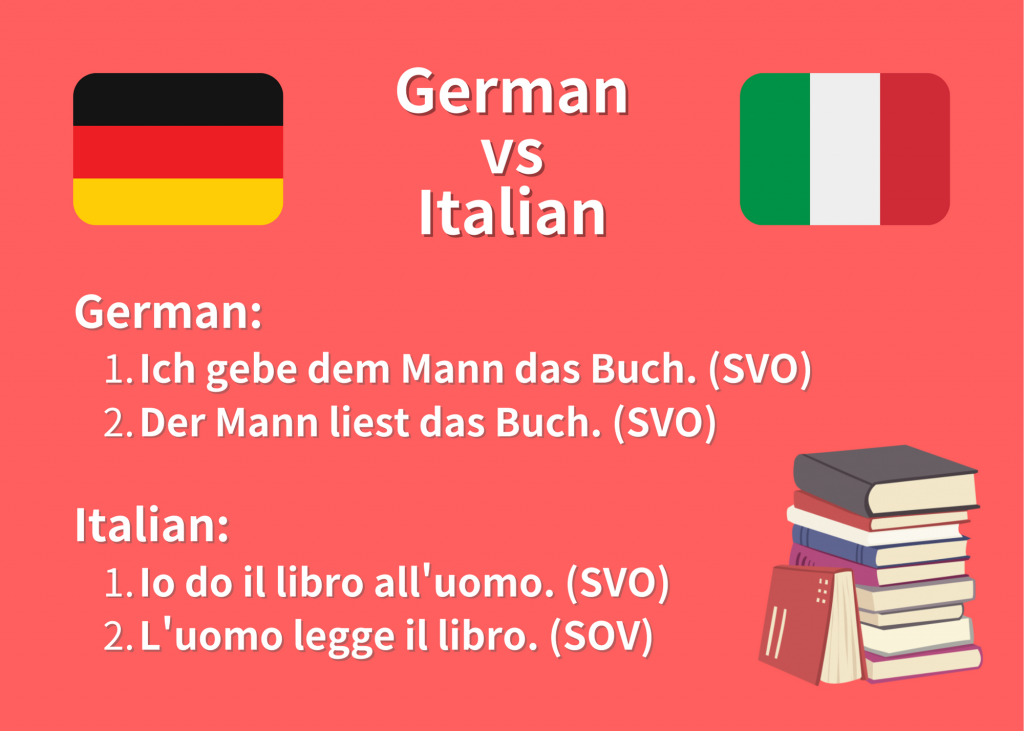Ciao! Or Guten Tag? German and Italian are two of the most widely spoken languages in the world, and each has its own unique charms and benefits. Discover the differences between them and find out which language is the best fit for you. Read on to learn more about German vs Italian: vocabulary, grammar, pronunciation, cultural differences, job opportunities, and which one is easier to learn.
Also check out:
Spanish vs Italian: Are They the Same Language?

Table of Contents
ToggleGerman vs Italian: How hard are they for English speakers?
Vocabulary
The vocabulary of German and Italian languages differ in origin, with German having more similarities to English due to their shared Germanic language roots, and Italian having more similarities to Latin. German is a West Germanic language, while Italian is a Romance language, both stemming from the Indo-European language family.
German vocabulary has been influenced by Latin, Greek, and French, and has also adopted many English loanwords in recent times. Italian vocabulary, on the other hand, has been heavily influenced by Latin and to a lesser extent, Greek and French. Both German and Italian also have regional dialects that can add to the diversity of their vocabularies.

Grammar
German and Italian are both Indo-European languages with complex grammar systems. In terms of grammar, German has four cases (nominative, accusative, dative, and genitive) and a strict word order of subject-verb-object (SVO).
The gender of nouns in German is indicated by the definite article (der, die, das), and can be either masculine, feminine, or neuter. Some patterns in determining the gender of a noun exist, but many nouns have arbitrary gender and must be memorized.
Italian, on the other hand, has two main cases (nominative and oblique) and a more flexible word order that allows for subject-verb-object (SVO) or subject-object-verb (SOV) arrangements.
The gender of nouns in Italian is indicated by the definite article (il, la) and can often be determined by the noun’s ending, with “-o” being masculine and “-a” being feminine. However, like in German, there are many exceptions to these rules, so memorization is often necessary to know the gender of a noun in Italian.

Pronunciation
The pronunciation of German and Italian differs greatly, with German having a more uniform pronunciation, while Italian pronunciation varies greatly depending on the region. German pronunciation is based on the 26 letters of the alphabet and is fairly straightforward. The pronunciation of Italian is more complex, with a greater emphasis on syllables and an intricate system of diacritics. Generally, Italian has a greater variety of consonants and vowels, as well as a wider range of accents.
German has a number of distinct pronunciation features, such as the rolling of the “r” and the soft “ch” sound. Examples of distinct German pronunciation include the word “Buch” (book), which is pronounced “boo-kh” with a soft “ch” sound.
Italian also has a number of distinct pronunciation features, such as the soft “g” sound and the nasal vowels. Examples of distinct Italian pronunciation include the word “giorno” (day), which is pronounced “jor-no” with a soft “g” sound, and the word “cena” (dinner), which is pronounced “chen-ah” with a nasal vowel.
German vs Italian: Job Opportunity
Learning either German or Italian can open up a wide range of job opportunities for those looking to work in Europe or other German or Italian-speaking countries. German is a major language in the European Union and is one of the most important business languages in the world.
Companies who operate in German-speaking countries may prefer to hire someone who is fluent in German. Similarly, Italian is spoken by millions of people in Europe and is also a major language in the European Union. Italian is popular in the tourism industry, so those who are proficient in the language may have the opportunity to find work in this industry.
Learning either German or Italian can also be useful for those looking to pursue higher education in either country, as many universities require proficiency in either language.

Cultural Difference Between Germans and Italians
Germans and Italians have different cultures which can be seen in various aspects of life. For example, Germans tend to be more formal in their interactions and value punctuality, while Italians are more relaxed and less punctual.
Meal times also vary between the two countries, with Germans usually having their main meal of the day in the evening, while Italians prefer to have their main meal of the day at lunch. In terms of cuisine, Germans tend to favor hearty dishes such as stews and drink beer (Prost!), while Italians favor lighter dishes such as pasta and drink mostly wine.
Germans also tend to be more individualistic than Italians, who value family and community more. Lastly, Germans tend to be more reserved in public, while Italians are more expressive and social.

German vs Italian: Which one should you learn?
German and Italian are two very different languages, each with its own unique benefits and challenges. Learning either language can open up a wide range of job opportunities, and can be useful for those looking to pursue higher education in either country. There are also cultural differences between the two countries, from meal times and cuisine to social behavior.
Ultimately, the decision of which language to learn depends on which one best suits your needs and preferences. To learn more about German and Italian, or to receive personalized language coaching, why not check out AmazingTalker, an online tutoring platform that offers personalized language coaching with native speakers? Also, discover the answers to your language-related questions on AmazingTalker’s Q&A page.
Read More:
5 Best Ways to Learn a New Language
Easiest Language to Learn For English Speakers: 10 for You
7 Most Useful Languages to Learn: What Language Should I Learn

















